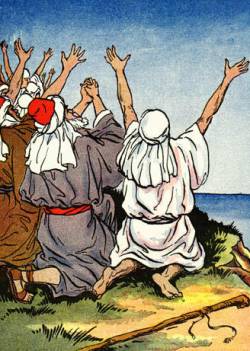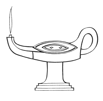
Part Three: The Will of God
Third Commandment
 The longest biblical text in the Decalogue is for the Third
Commandment.
The longest biblical text in the Decalogue is for the Third
Commandment.
While both Exodus and Deuteronomy prescribe the Sabbath, the motive and the manner of its observance are different. Both passages, though lengthy, should be quoted in full. In Exodus, the Sabbath is a weekly commemoration of God’s creation. Remember the sabbath day and keep it holy. For six days you shall labor and do your work, but the seventh is a sabbath for Yahweh, your God. You shall do no work that day, neither you nor your son nor your daughter nor your servants, men or women, nor your animals, nor the stranger who lives with you. For in six days Yahweh made the heavens and the earth and the sea and all that these hold, but on the seventh day He rested; that is why Yahweh has blessed the sabbath day and made it sacred (Exodus 20:8-11). In Deuteronomy, the Sabbath is prescribed as a weekly commemoration of God’s deliverance of His people, as the following words indicate: Observe the sabbath day and keep it holy, as Yahweh, your God, has commanded you…Remember that you were a servant in the land of Egypt, and that Yahweh, your God, brought you out from there with mighty hand and outstretched arm; because of this, Yahweh, your God, has commanded you to keep the sabbath day (Deuteronomy 5:12-15). No Jewish observance figures more prominently in the New Testament than the Sabbath. Christianity retained the Sabbath and elevated it to a unique dignity.
Old Testament ObservanceObserving the Sabbath was one of the most important precepts of pre-Christian Judaism. It was developed independent of the temple and became identified with the synagogue, even among the Jews of the dispersion, who lived far from Jerusalem. The Sabbath marked off the Jewish people from the Gentiles, and for much of their history was the one visible sign of being a true Israelite. As the rabbis began to explain the meaning of the Sabbath rest, a variety of interpretations arose. There were no less than thirty-nine types of work classified by experts in Judaic law. Forbidden on the Sabbath were the lighting of fire, clapping the hands, visiting the sick, and walking beyond a certain distance. A Sabbath day’s journey, referred to by St. Luke, was about three thousand feet (Acts 1:12), unless a person set up a temporary domicile by depositing a personal possession some distance from home.
New Testament TeachingJesus observed the Sabbath according to reasonable standards, and occasionally taught in the synagogues on the Sabbath (Mark 6:2; Luke 4:16, 31). But soon the Pharisees began to criticize His disciples for rubbing grain between their hands on the Sabbath, which was condemned as work. Christ was especially severe in rebuking those who condemned His performing miracles of healing on the Sabbath. His decisive teaching is summed up in the sentence that, “The Sabbath was made for man, not man for the Sabbath; so the Son of Man is master even of the Sabbath” (Mark 2:27). In saying this, Jesus laid the foundation for the Christian observance of the Third Commandment. There is, indeed, to be one day set aside each week to become what it now is, the Lord’s Day. But the emphasis is to be on giving the day to the Lord. There are references in apostolic times to the reading of the prophets and the Pentateuch (first five books of the Bible) on the Sabbath to present the gospel to Jewish audiences (Acts 13:14, 16:13). But soon the Judaizing Christians tried to impose the Sabbath observance on Gentile Christians. The result was that Paul declared that no one may be held bound to observe the Sabbath (Colossians 2:16), until finally Christians were completely freed from the Jewish obligations of the Sabbath law.
Sunday ObservanceThe name “Sunday” for the first day of the week was borrowed from the Romans who had borrowed it from the Egyptians. It was dedicated among the pagans to the sun which was worshipped as a god. But already in the first century, Christians understood Christ as the “Sun of Justice” (Malachi 4:2), and therefore the one true God who became man. He was the one whom they worshipped on Sunday. Moreover, the name in Christian language was changed to the “Lord’s Day,” as used by St. John the Apostle during his exile for the faith. “I was on the island of Patmos,” he wrote, “for having preached God’s word and witnessed for Jesus; it was the Lord’s Day and the Spirit possessed me” (Revelation 1:10). The Christian practice of meeting on the first day of the week to celebrate the Eucharistic Sacrifice is clearly described in the Acts of the Apostles and in St. Paul (Acts 20:7; I Corinthians 16:2). In The Teaching of the Twelve Apostles(first century), the faithful are told, “On the Lord’s Day, assemble in common to break bread and offer thanks (eucharistesate); but first confess your sins, so that your sacrifice may be pure: (Didache 14). St. Ignatius of Antioch (died 107 A.D.) speaks of Christians as “no longer observing the Sabbath but living in the observance of the Lord’s Day, on which also our Lord rose again” (Letter to the Magnesians, 9). With the end of the great persecutions in the early fourth century, the Church began to make laws on the proper observance of Sunday. Thus in Spain, the bishops legislated that, “If anyone in the city neglects to come to church for three Sundays, let him be excommunicated for a short time so that he may be corrected” (Council of Elvira, 306 A.D.). About the same time laws were passed requiring the faithful to hear Mass and rest from servile work on Sunday. In drafting these laws, it was stated that both practices go back to the teaching of the apostles. Over the centuries, Sunday became established as the principal feast day, each week, for the faithful. Three reasons were given:
Church’s LegislationThe new Code of Canon Law opens its legislation on “Feast Days” with several canons pertaining to the proper observance of Sunday. It also identifies what have come to be called holy days of obligation. The Lord’s Day, on which the Paschal Mystery is celebrated, is by apostolic tradition to be observed in the universal Church as the primary holy day of obligation…. In the same way the following holy days are to be observed: the Nativity of our Lord Jesus Christ, the Epiphany, the Ascension, the feast of the Body and Blood of Christ, the feast of Mary the Mother of God, her Immaculate Conception, her Assumption, the feast of St. Joseph, the feast of the Apostles, Saints Peter and Paul, and the feast of All Saints…. However, the Episcopal Conference may, with the prior approval of the Apostolic See, suppress certain holy days of obligation, or transfer them to a Sunday…. On Sundays and other holy days of obligation, the faithful are obliged to assist at Mass. They are also to abstain from such work or business that would inhibit the worship to be given to God, the joy proper to the Lord’s Day, or the due relaxation of mind and body…. The obligation of assisting at Mass is satisfied whenever Mass is celebrated in a Catholic rite, either on a holy day itself or on the evening of the previous day (Canons 1246-1248). Accordingly, the Catholic Church’s understanding of the Third Commandment could not be clearer. The faithful are gravely bound to worship together on Sundays and holy days of obligation by participating in the Sacrifice of the Mass. This is their primary obligation in observing this commandment of the Decalogue. They are also to avoid such work or business as would either interfere with their worship of God, or prevent them from celebrating the Lord’s Day with peaceful joy, or deprive them of such rest and relaxation of mind and body as every person requires. Modern popes have been outspoken to public officials and heads of business and industry, urging them to give the people freedom to worship and rest on Sundays. Pope John XXIII called it “a heavy responsibility.”  Copyright © 2002 Inter Mirifica
Pocket Catholic Catechism |